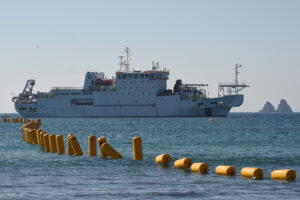
(Photo by Mohd RASFAN / AFP)
How ASEAN’s IP Transit Services can improve internet connectivity
Everybody wants good internet. But to have good internet, the network connectivity and infrastructure have to be stable and reliable. Latency issues need to be solved and increased bandwidth speeds are key to achieving that.
While the internet is available in most parts of Southeast Asia, there are still several areas with poor coverage. Some common reasons for this include a lack of infrastructure, as well as geographically challenging locations.
However, when it comes to urban areas, businesses large and small need to have full internet access. Be it running data centers, producing online entertainment, or providing financial services, an internet outage can lead to serious repercussions.
To ensure stable internet services, network and infrastructure providers need to work together to ensure there are no disruptions. This includes collaboration at all levels, from cabling, all the way to network delivery.

(Photo by BORIS HORVAT / AFP)
Recently, Google and Facebook announced Apricot, a new subsea cable that will connect Singapore, Japan, Guam, the Philippines, Taiwan, and Indonesia. It is expected to be ready for service in 2024. Echo, another subsea cable, was also announced earlier this year. Echo will connect the U.S., Singapore, Guam, and Indonesia.
The Echo and Apricot cables are complementary submarine systems that will offer benefits with multiple paths in and out of Asia, including unique routes through southern Asia, ensuring a significantly higher degree of resilience for Google Cloud and digital services. Together they’ll provide businesses and startups in Asia with lower latency, more bandwidth, and increased resilience in their connectivity between Southeast Asia, North Asia, and the United States.
Providing stable and reliable connectivity
For the northern part of Southeast Asia, Malaysia’s national connectivity and digital infrastructure provider Telekom Malaysia Berhad (TM) has joined forces with India’s Tata Communications to offer stable, high-speed, and reliable connectivity in the ASEAN region and open access to global enterprises as well.
This collaboration will enable Tata Communications to optimize TM’s reachability within the ASEAN region through terrestrial networks and submarine cables to the neighboring countries. The submarine cables include the Malaysia-Cambodia-Thailand submarine cable for connectivity to Indochina and, Nusantara Gateway submarine cable for connectivity to Indonesia.
Commenting on the collaboration, Amar Huzaimi Md Deris, Executive Vice President of TM WHOLESALE, stated, “This is part of our effort to enhance our internet service performance with expanded global reach for service providers in Malaysia and neighboring countries to meet the growing IP networks requirements.
“This collaboration underscores our commitment to our customers for delivering world-class network service, brings us one step further to achieve our aspiration as the trusted digital hub in the ASEAN region.”
Service providers, mobile network operators, and internet service providers in the region will be able to address their customers’ growing data connectivity needs by providing access to a global Tier 1 Internet Protocol (IP) network.
The collaboration will also help deliver a reliable, stable Tier-1 IP Transit (IPT) service, an internet connectivity service that enables end-users to access all websites and content on the internet.
As part of this arrangement, Tata Communications will expand its IPT service coverage leveraging TM’s data center, extensive connectivity, and network infrastructure in Malaysia. TM will also benefit from Tata Communications’ global Tier-1 IP network to serve customers in more than 190 countries and territories hence further extending TM’s IP transit coverage and enhances its regional TMiX offering.
“By offering high-capacity and low-latency IP transit services to and from Malaysia for both our customers, we bring forth synergies for a more robust, secure, and flexible IP platform,” said Sumeet Walia, Chief Sales and Marketing Officer, Tata Communications.
Malaysia’s lack of a bridge over troubled waters
The collaboration of TM and Tata Communications comes at a crucial time as Malaysia was recently criticized for refusing to continue exemptions on its restrictive cabotage policy.
In 2018, the democratically-elected, Pakatan Harapan-led government under Mahathir Mohamed had exempted the country’s long-running restrictive cabotage policies and allowed non-Malaysian ships to carry out repairs on submarine cables.
However, led by Prime Minister Muhyiddin Yassin of the Perikatan Nasional party, the revocation of the exemption came into effect in November 2020 after his government overtook the previous one. As a result, Malaysia was bypassed by both the Echo and Bifrost cables, despite the nation’s strategic location in the region.
According to recent news reports, Google, Microsoft, Facebook, and a couple more tech giants have written to the newest Malaysian Prime Minister in 2021, Ismail Sabri Yaakob, seeking the reinstatement of the cabotage exemption policy.
Malaysia Internet Exchange and the Malaysia Digital Economy Corporation have cited the revocation of the cabotage exemption as one of the reasons why Facebook and Google’s newest subsea cable Apricot, had bypassed Malaysia entirely.
While it’s unclear what Yaakob’s government plans to do next with the existing cabotage policy, TM and Tata Communications are ensuring the IP transit services will provide better, stable, and reliable internet connectivity to users.
READ MORE
- Ethical AI: The renewed importance of safeguarding data and customer privacy in Generative AI applications
- How Japan balances AI-driven opportunities with cybersecurity needs
- Deploying SASE: Benchmarking your approach
- Insurance everywhere all at once: the digital transformation of the APAC insurance industry
- Google parent Alphabet eyes HubSpot: A potential acquisition shaping the future of CRM




